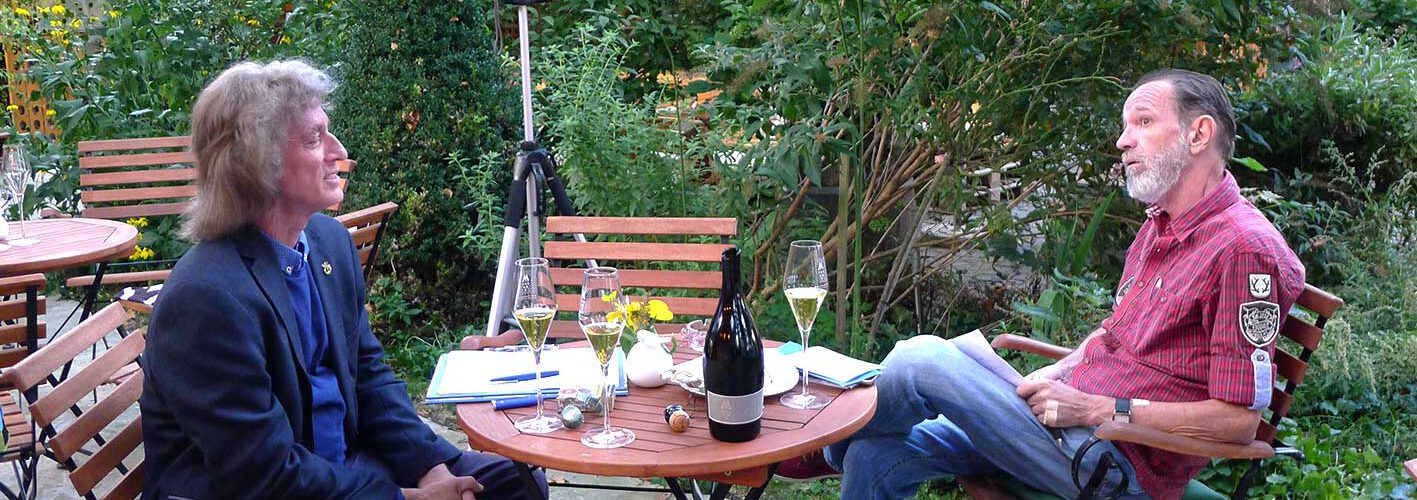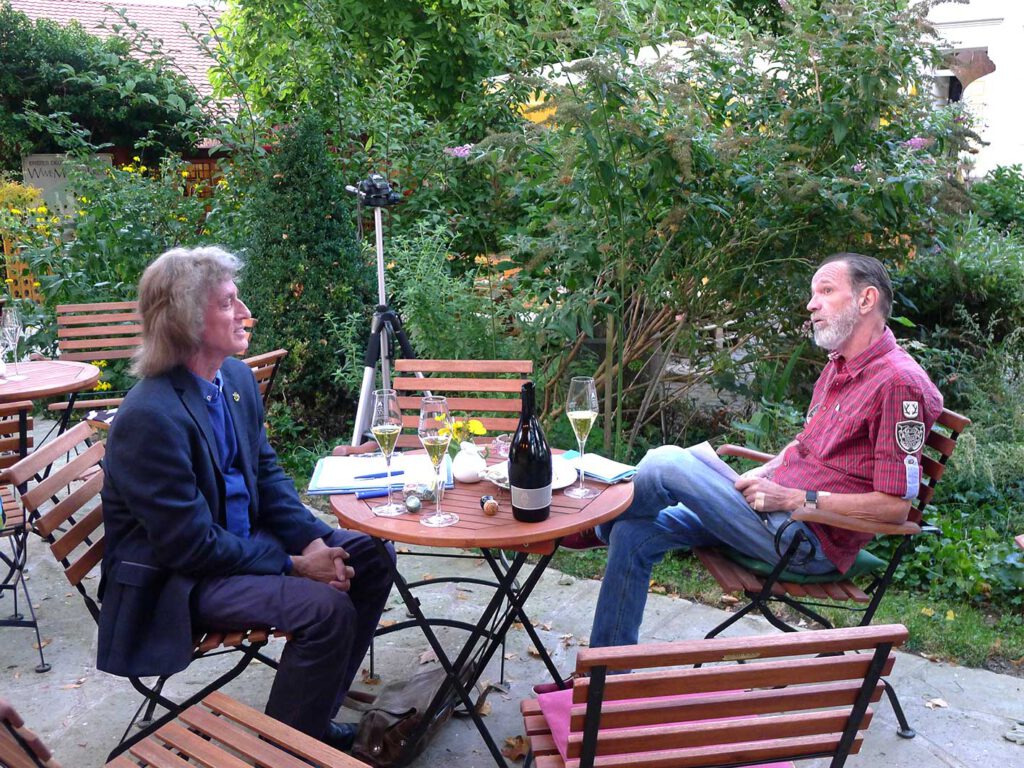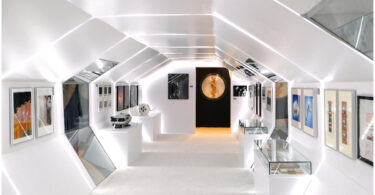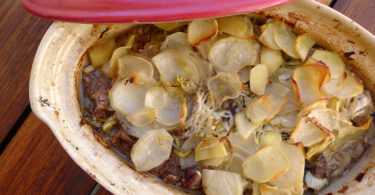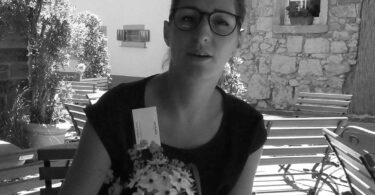[typography font=”Abril Fatface” size=”20″ size_format=”px” color=”#e1cca1″][dropcap]F[/dropcap][/typography]or 7 years now, sommelier Uwe Warnecke and Philipp Kiefer have been organising the “véritable” wine fair in St.Martin in the Palatinate. Every year, the big names of the international winegrowers’ scene meet there to present their products to the professional public.
Grandgourmand had the great pleasure of interviewing the renowned sommelier in detail. The interview took place in the “Villa im Paradies” in Deidesheim. Marie Menger-Krug runs one of the best sparkling wine manufacturers in Germany.
GG: “Whoever can enjoy, no longer drinks wine, but tastes secrets”, a sentence written by the great surrealist Salvador Dali.
Maybe that’s why you wanted to become a sommelier, to get a little closer to the secret of wine?
Uwe Warnecke: No, the subject of wine is to combine, sometimes very extreme.
GG: Was there a source of inspiration in your career, perhaps a mentor?
Uwe Warnecke: There are a few people: Hardy Rodenstock, Wolfgang Engelhardt, Peter Beck, Werner Knipser and Bernd Philippi, with these people I was allowed to drink the greatest wines in the world.
That means for me back to the 19th and 20th century, great cinema, for example 47 or 23 Pétrus, Mouton, everything there is.
My fatherly friend, I like to say, is Bernd Philippi. He comes from Kallstadt, where he has the famous location “Saumagen”. He has the centrepiece in place, the prime fillet, his Riesling is cult and legend! He is a great connoisseur, travels around the world together with Bernhard Breuer.
With him, by the way, he has a winery in Portugal. Both work as consultants, for example in Madeira. Phillipi was the first one I met in the Palatinate, we had dinner together practically every weekend, he always had his mixed breed dog from Madeira with us.
We drove through the vineyards together, to Freinsheim. There was a very small Italian restaurant there. We drank simple Chianti, ate carpaccio and small calamares.
GG: A sommelier does not simply decline vocabulary or learn facts from memory. The guest should be enthusiastic about the product. Isn’t the sommelier in a way also a moderator, who knows many different areas, so that he can lead an inspiring conversation with his guests?
Uwe Warnecke: Sometimes it seems to me that the sommelier is too much commentator. The sommelier should already be enthusiastic about the product, but he should also stay in the background.
GG: It is a special talent not simply to follow a trend in a reflexive manner, but to recognize trends and innovative details.
Is this a science for you, is it stylistic considerations, or does passion help in the end to find the right track?
Uwe Warnecke: There are only three things: passion, enthusiasm and emotions. If they’re not there, no matter what you do and be it crochet, you can put the lid on, it won’t work.
GG: Let’s talk about wine and food. A good sommelier focuses on specific accents, which in turn evoke differentiated reactions. In my opinion, a subtle recommendation stands before a “palatable” overall picture. Afterwards, food and wine intermesh in the finest way, creating a multi-faceted, complex aroma painting.
Do you achieve this goal with intuition or do conceptual considerations predominate?
Uwe Warnecke: I would say quite clearly: With intuition. I can’t go to the guest at the table and start with a concept. I have to approach each guest differently, I have to check beforehand what he would be prepared to spend for a bottle of wine.
GG: For you at the time of the wine trend, if it even exists?
Uwe Warnecke: At the moment: Rosé! By the way, Markus Molitor also cultivates rosé on the Moselle, Markus Schneider cultivates it with great success. It’s definitely a little trend, rosé!
GG: You have travelled a long way, somewhere in the world there will always be a wine you can tell a story about, which you have already tried.
Where do you think the wine from your adopted country Deidesheim is compared internationally?
Uwe Warnecke: I have to go way back. There are large wineries in Deidesheim that are already very old: Bassermann-Jordan, von Buhl, von Deinhard, von Winning, Menger-Krug.
We have world-class locations here, Kirchenstück, Pechstein, absolute top Riesling.
GG: A sommelier has to be sensitive and make clear decisions at the same time, the wine has to go with the food, although the taste perception is extremely subjective.
First of all, it is not unusual for the guest to have a completely different idea than the sommelier.
Do you approach this subject with a method, or do you make the selection “from the instinct”?
Uwe Warnecke: I never want to overwhelm a guest, I never want the guest to think I am smarter than he is. I don’t want him to realize, that I’m here. I want to play with my guest, let him enjoy it without his wallet hurting.
GG: A good topic, wouldn’t it be time to rethink the prices on the wine list? I often pay excessive prices for a mediocre wine!
Uwe Warnecke: Yes, the wine lists in Germany are totally overpriced. The restaurateurs have a calculation with a multiplication factor of 300, that is a No-Go! I don’t enjoy drinking a “Großes Gewächs” with my wife in the evening, which is very expensive anyway, I can’t afford a second bottle anyway. After all, you want to eat, order a dessert and have a cup of coffee. The gastronomy has to calculate this more favorably and increase the turnover rate!
GG: The “véritable” will go into its 8th edition in 2018. Initially still an insider tip, the exclusive wine fair in beautiful St.Martin has developed into one of the top events in the business. Over and over again you succeed in attracting winegrowers who enjoy an excellent international reputation:
Dirk Niepoort, who revolutionized viticulture in Portugal, Alois Lageder – organic wine legend from South Tyrol, Angelo Gaja – who developed wine to perfection in Italy, Pierre Trimbach from Alsace with his wonderful Rieslings and Pinots, Baron Patrick de LaDoucette – Godfather of Pouilly-Fumé and many others.
How would you explain this success story to our readers?
Uwe Warnecke: I wouldn’t count LaDoucette among them, it’s a mass product. On the Loire there are 3 or 4 really excellent wines, for example Didier Dagueneau. These are very special wines, not as accommodating as LaDoucette. The véritable is the most beautiful wine fair in Germany.
But to your question: I have good contacts, call my friends and they come. It’s the winegrowers themselves who stand at their stand, you don’t see any painted fingernails. I want the winegrowers themselves! Even if they still have dirt from the vineyard on their clothes, these are the guys I need!
GG: Would you perhaps have some statistics for us, such as visitors, sales volume, etc.?
Uwe Warnecke: 650 visitors, next year 100 winegrowers, otherwise I don’t like to talk about numbers.
GG: Parkhotel Restaurant “La Truffe” (sommelier), Deidesheimer Hof (Maître d’Hôtel), Queen Elisabeth II (restaurant manager). These are only a few stages of your professional career.
Which of these prestigious stations do you associate with the most interesting memories?
Uwe Warnecke: “La Truffe”, that was a very interesting time. We did great things, the salmon was cut at the table, tartar, making crêpes suzette at the table, filleting fish correctly, snipe, quails, very classic, hardly exist today. They worked right in front of the guest. You could learn a lot.
I had the great fortune to work as a maître de restaurant in the Aachen gala with Joel B. Payne, at that time he was my cupbearer, I like that word better than the sommelier.
I stood over him in that position, but I never stopped learning from Joel. There was the largest private portwine-cellar in Germany: Graham, Cockburn, Taylor, Niewpoort and many others.
GG: How many bottles do I need to drink to approach your level of knowledge?
Uwe Warnecke: Not to be quantified in numbers, if a wine does not taste me, then it is put aside, is not drunk.
GG: Your personal favourite is a Riesling from the Palatinate?
Uwe Warnecke: No, no, my favorites are a “Château Cheval Blanc 1947 MAGNUM”, or a 23er Pétrus MAGNUM.
GG: it’s hard to get to, isn’t it?
Uwe Warnecke: Of course I can’t afford it either, but I was allowed to taste it.
GG: Your opinion about the screw cap?
Uwe Warnecke: A good thing in the lower price range for the gastronomy, especially for serving in glasses. For me, cork is indispensable for the high qualities.
If the waiter doesn’t enjoy opening the bottle, that’s not good.
GG: I have already heard a lot about your own wine, the Crazy Uwe, would you tell our readers something about it, could I perhaps even taste it?
Uwe Warnecke: Of course you can taste it, I’ll send you a bottle. Philipp Kiefer developed it according to my ideas.
It lies in a cellar, 250 years old, spontaneous fermentation in a Nick Weis barrel.
I recommend Magnums! Next year, Crazy Uwe, just Magnums.
A very light wine with 8.5% alcohol, I do not have the soils here like on the Moselle. Nevertheless, I managed a wine, with a good acidity and a great statement!
I have one final comment:
The sommeliers make many mistakes: the boys claim that wine in glass is not possible. Often the wine knowledge does not go beyond the wine list.
Without further inquiry longer lectures are held, but I only want to drink and enjoy wine! Digestif knowledge often goes towards zero.
The sommelier’s title is falsified: cheese sommelier, water sommelier, bread sommelier, what’s the point?
The constant refilling, one mixes old and fresh wine, all the time.
Often the wine is poured on much too early.
Working at the table is practically extinct, who knows about a duck press, for example?
Something else for decanting: It is better to do this with young wines, the old ones should be left alone, otherwise they oxidize too quickly.
Dear Uwe Warnecke, thank you very much for this interview!
[amazon_link asins=’383381621X,3833839570′ template=’ProductCarousel’ store=’de-1′ marketplace=’DE’ link_id=’2c80b3f7-dd25-11e7-8699-4ffaee26a2fa’]
![[:de]Grandgourmand, Travel, Food, Lifestyle[:]](https://grandgourmand.de/wp-content/uploads/2023/01/logo_23_1-1.png)
